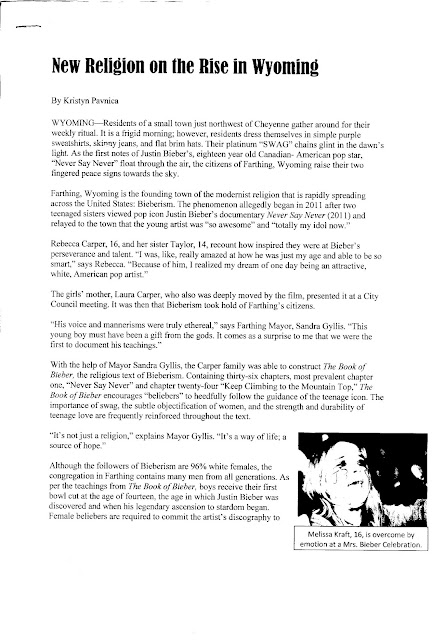Thursday, April 26, 2012
Wednesday, April 25, 2012
Friday, April 20, 2012
Eye Candy- Paris and Slow Mo
This is the intro to the film Midnight in Paris. Let's use this a means to capture the essence of the city as how Charlie would remember it.
For the bull in the china shop itch some might have...
Tuesday, April 17, 2012
Saturday, April 14, 2012
Thursday, April 12, 2012
Clever Writing- #1278
When people write critically about Facebook, they often say that “you are the product being sold,” but I think that by now we all get that. The digital substance of our friendships belongs to these companies, and they are loath to share it with others. So we build our little content farms within, friending and upthumbing, learning to accept that our new landlords are people who grew up on Power Rangers.From Facebook and Instagram: When Your Favorite App Sells Out
one more..This is repost from one of my favorite sites The Dish.
What is brilliant and honest about this site is how the editors cull debates and reflect the depth of arguments.
This is a copy of the post:
Emily Shire semi-defends pageant moms on "Toddlers and Tiaras":
The mothers on Toddlers and Tiaras are chastised for ignoring their children’s feelings, forcing their own desires upon them, and spending exorbitant amounts of money to do so. If the mothers on Toddlers and Tiaras expended their funds and parental pressure on SAT tutoring, squash instruction, or foreign language immersion, they likely would not be dismissed as broad caricatures that are all too easy to hate. Because in reality, the main difference between a pageant mom and a tiger mother is just a matter of accessories.Roxie, a commenter, counters:
Neither 'pageant moms' or 'tiger moms' are saints, but calling them the same is outrageous. Teaching a child to persevere through pain and suffering to attain skills that will serve them for the rest of their lives is one thing, teaching a child to suffer to attain a standard of beauty that will slip through their fingers before they're 30 is quite another.
Tuesday, April 10, 2012
Satire- Spatula City Analysis
From a silly, silly movie...
1. What from Fowles "15 basic needs..." are in this ad?
2. What VALS technique?
3. What is the target of the satire?
More from the most amazing creature...
1. What from Fowles "15 basic needs..." are in this ad?
2. What VALS technique?
3. What is the target of the satire?
More from the most amazing creature...
Tuesday, April 3, 2012
Huck Conclusion- Critical Reading Journal
 Here is our triumphant return to the Critical Reading Journal. Don't forget the requirements for this assignment!
Here is our triumphant return to the Critical Reading Journal. Don't forget the requirements for this assignment!1. Prior to reading your exerpt of literary criticism, describe how you interpret the end of the novel. Why do you think so many people are upset by the behavior of Huck in the presence of Tom Sawyer?
2. Read your article and the following excerpt from a Jane Smiley article from Harper's (cited from the Chicago Reader here). How would you challenge, defend, or qualify these ideas regarding the conclusion of the novel?
As with all bad endings, the problem really lies at the beginning, and at the beginning of The Adventures of Huckleberry Finn, neither Huck nor Twain takes Jim’s desire for freedom at all seriously, that is, they do not accord it the respect that a man’s passion deserves. The sign of this is that not only do the two never cross the Mississippi to Illinois, a free state, but the Jackson’s Island scenes show that such a crossing, even in secret, is both possible and routine, and even though it would present legal difficulties for an escaped slave , these would certainly pose no more hardship than locating the mouth of the Ohio and then finding passage up it. It is true that there could have been slave catchers in pursuit (though the novel ostensibly take place in the 1840’s and the Fugitive Slave Act was not passed until 1850), but Twain’s moral failure, once Huck and Jim link up, is never even to account for their choice to go down the river rather than across it. What this reveals is that for all his lip service to real attachment between white boy and black man, Twain really saw Jim as no more than Huck’s sidekick, homoerotic or otherwise. All the claims that are routinely made for the book’s humanitarian power are, in the end, simply absurd. Jim is never autonomous, never has a vote, always find his purposed subordinate to Huck’s and , like every good sidekick, he never minds. He grows every more passive and also more affectionate as Huck and the Duke and the Dauphin and Tom (and Twain) make ever more use of him for their own purposes. But this use they make of him is not supplementary; it is integral to Twain’s whole conception of the novel. Twain thinks that Huck’s affection is good enough reward for Jim.3. After viewing the documentary Born to Trouble and reading one of these editorial articles from NYT , where do you fall in the debate about the novel? What are your observations or criticisms of the documentary as a "text"?
Due Monday-
Subscribe to:
Posts (Atom)


